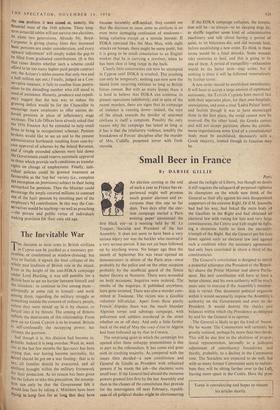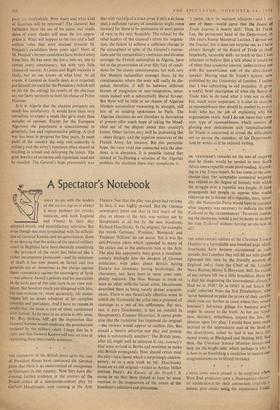Small Beer in France
By DARSIE GILLIE
AN election coming at the end of such a year as France has ex- perienced might well promise much greater alarums and ex- cursions than this one so far does. Two days after the elec- tion campaign started a Paris evening paper announced the first black eye—at a meeting held by M. Le Troquer, Socialist and President of the last Assembly. It does not seem to have been a very serious injury nor was the heckler who received it a very serious person. It has not yet been followed up by anything worse. No longer ago than the month of September fire was twice' opened on demonstrators in streets of the Paris area—once probably by the police and on the other occasion probably by the unofficial guard of the Simca motor factory at Nanterre. There were wounded on both occasions. Inquiries were ordered. The results of the inquiries, if published anywhere, have gone unnoted. There was also a murder com- mitted at Toulouse. The victim was a Gaullist volunteer bill-sticker. Apart from these purely French disputes there was the much bloodier Algerian terror and sabotage campaign, with policemen and soldiers murdered in the street whether on or off duty. And only a little' farther back at the end of May the coup dYtat in Algeria had been followed up by that in Corsica.
The surprising quiet in which the campaign has opened after these unhappy premonitions is due in part to the referendum. It has come and gone with its crashing majority. As compared with the issues then decided—a new constitution and General de Gaulle as President with enhanced powers if he wants the job—the elections seem small beer. If the General had abased the immense powers granted him first by the last Assembly and then in the clauses of the constitution that provide for the interregnum till next February, republi- cans of all political shades might be electioneering Paris about the twilight of Liberty, but though no doubt it still requires the safeguard of perpetual vigilance its champions on the whole now think of the General as their ally against his own disappointed supporters of the extreme Right. Or if M. Soustelle had had his way, had linked the main body of the Gaullists to the Right and had obtained an electoral law with voting for lists and very large constituencies, the Centre and Left might be fight- ing a desperate battle to limit the inevitabl! • triumph of the Right. But the General put his foot down against such an electoral law and against such a coalition when the necessary agreements had only been concluded in about a third of the constituencies.
The General's constitution is designed to install a powerful arbitrator (the President of the Repub- lic) above the Prime Minister and above Parlia- ment. His new constitution will have at least a better chance, and his own authority will be much more easy to exercise if the Assembly's member- ship is varied. One dominant political organism within it would necessarily impose the Assembly's authority on the Government and even on the President. It would destroy the checks and balances within which the Presidency as designed by and for the General is to operate.
The General is likely to get the kind of Assem- bly he wants. The Communists will certainly be greatly reduced, perhaps by more than two-thirds. This will be due first to the abolition of propor- tional representation, secondly to a judicious adjustment of constituency boundaries, and thirdly, probably, to a decline in the Communist vote. The Socialists are expected to do well, but with so many former Communist seats to redistri- bute they will be sitting farther over to the Left, leaving more space in the Centre. Here the pros- pests are incalculable. How many and what kind of Gati!lists will be returned? The General has forbidden them the use of his name, but candi- dates of many shades will none the less appro- priate it. What will happen to the two and a half million votes that were drained towards M. Poujade's candidates three years ago? Most of M. Poujade's former candidates have broken away from him. He has none the less a new set, one in almost every constituency, but with very little chance of success. A Centre and Right majority is likely, but no one knows of what kind. At all events, if General de Gaulle does, as is expected, put himself forward for the Presidency (which will be his for the asking) the results of the elections arc not likely seriously to limit his choice of Prime Minister.
It is in Algeria that the election prospects are much less satisfactory. It would have been very unrealistic to expect a result that gave more than samples of opinion. Except for the European Algerians, the population is unaccustomed to genuinely free and representative polling. A civil war has been in progress for four years. In most parts of the country the only real authority is military and the army's functions often extend to teaching in school and delivering the letters. The grim horrors of terrorism and repression need not he recalled. The General's hope presumably was that with the help of a truce (even if only a de facto one) a sufficient variety of candidates might come forward for there to be spokesmen of most points of view in the next Assembly. The refusal by the rebel leaders of the General's terms for negotia- tion, the failure to achieve a sufficient change in the atmosphere in spite of the General's instruc- tions and the extraordinary confusion and division amongst the French nationalists in Algeria, have led to the presentation of over fifty lists of candi- dates for the twenty constituencies; but with very few Moslem nationalists amongst them. In the constituencies where the seats will really be dis- puted, therefore, it will be between different brands of integration or near-integration, some- times indeed with a substantially liberal flavour. But there will be little or no chance of Algerian Moslem nationalism measuring its strength, still less of its sending spokesmen to Paris. The Algerian elections do not therefore in themselves at present offer much hope of taking the blood- shed out of the dispute about that country's future. Other factors may well be promoting this —sheer fatigue, and the superior resources of the French Army, for instance. But this particular hope, the most vivid one connected with the elec- tions, is in abeyance. It is possible indeed that instead of facilitating a solution of the Algerian problem the elections there may complicate it.







































 Previous page
Previous page